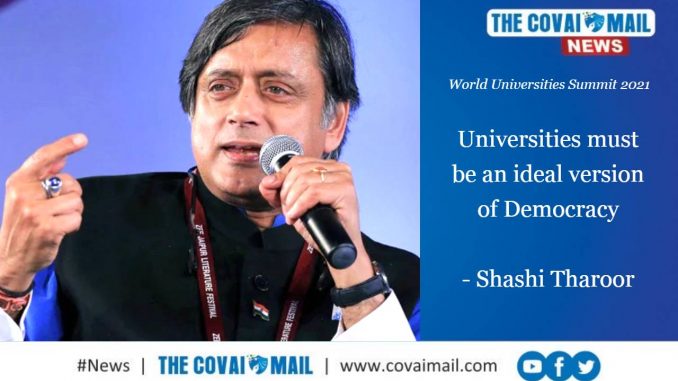
“In a democratic society, universities must evolve into spaces where an ideal version of democracy is allowed to thrive. In other words, our universities must become the staging grounds for experiments in developing the most principled version of our democratic ethos. And by extension, a microcosm of what our democratic society one day could be”, said Shashi Tharoor, Member of Parliament, India.

“We cannot reach these ideals if we do not actively strive to ensure that our campuses are inclusive and representative. No democratic model can sustain itself if it does not carve out spaces for all voices, no matter how big or small to be heard. This cannot merely be rectified through instruments like affirmative action, and need-based scholarship programmes, but through a commitment to really taking a stock of the barriers to access, and inclusion, that permeates all levels of our society, he said.
He was delivering the Distinguished Public Lecture at the World Universities Summit 2021 on “Universities of the Future: Building Institutional Resilience, Social Responsibility and Community Impact” organised by O.P. Jindal Global University.
During his lecture, he highlighted, “The widespread transmission of the covid-19 virus and the corresponding impact of the ongoing pandemic has spared no segment of our communities. The present pandemic has also posed a series of existential questions and formidable challenges to universities across the world. Even as more of the planet gets vaccinated, it is fair to recognise that the current set of complexities which universities are grappling with mark a watershed moment.”
“The future of our universities must be rooted in developing generational leaders, that is more ready to deal with the national and global order, a world where multiple realities can coexist, where alternative worldviews and convictions have to be encouraged and negotiated with, and where students are taught to look beyond themselves, and their immediate surroundings, to the reality of interdependence and peaceful coexistence”, Tharoor further added.
He said, “It is vital that our universities, therefore, be courageous enough, to remain as free and open spaces, where dissent and multiple worldviews are welcomed and cherished, for their complexity and diversity.”
He further outlined that the future of our universities, indeed of our higher education system, lies in striking a careful balance between utilitarian needs, that our technical educations provide, and the broader liberal arts system that will help our graduates expand their horizons and cultivate their intellectual sensibilities.
Tharoor pointed out that a study recently predicted that 30 % jobs in the world in 2030 will be those that do not exist today! He went on to say, “How can you educate young people for jobs that don’t exist? Our traditional utilitarian approach in India has been to shove facts into the students from school and college onwards, make them memorise stuff and then regurgitate it in the examinations. Today, we can get facts off the internet, but we need individuals who can react to unfamiliar facts, who can discover new information, who can understand new information.”
Tharoor also delved deeply into the issue of employability which is connected to the quality of higher education. He said, “Meeting the forces of markets demands research, the pursuit of usable knowledge, and the imperative of building an equitable society. We are suffering from a systemic problem of skill mismatch, with respect to qualifications and job opportunities. The image of India has changed from that of a backward, developing country to a sophisticated land, which produces doctors, engineers and computer experts. The education sector needs to keep up with the world!”.
